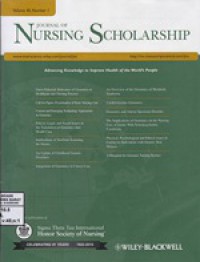
Jurnal
Nurses Preparedness and Perceived Competence in Managing Disasters
Purpose: This article is a descriptive analysis of rural nurses’ perceived readiness to manage disaster situations. Design and Methods: The 58-item Disaster Readiness Questionnaire was used to survey hospital-based nurses from rural communities in Texas during the summer of 2011. The data were collected by emailing a link through the various hospital intranet sites, resulting in a sample size of 620 nurses. Results: Findings revealed that most nurses are not confident in their abilities to respond to major disaster events. The nurses who were confident were more likely to have had actual prior experience in disasters or shelters. Selfregulation of behavior (motivation) was a significant predictor of perceived nurse competence to manage disasters only in regard to the nurse’s willingness to assume the risk of involvement in a disaster situation. Healthcare climate (job satisfaction) was not a determinant of disaster preparedness. Conclusions: Global increases in natural and human-induced disasters have called attention to the part that health providers play in mitigation and recovery. Since nurses are involved in planning, mitigation, response, and recovery aspects of disasters, they should actively seek opportunities to participate in actual disaster events, mock drills, and further educational opportunities specific to disaster preparedness. Administrators must support and encourage disaster preparedness education of nurses to promote hospital readiness to provide community care delivery in the event of a disaster situation. Clinical Relevance: Nursing comprises the largest healthcare workforce, and yet there is very little research examining nurses’ readiness for disaster.
Availability
No copy data
Detail Information
- Series Title
-
Journal of Nursing Scholarship, Volume 45, Number 3 2013
- Call Number
-
(05) 610.5 WIL j
- Publisher
- Malden : Wiley-Blackwell., 2013
- Collation
-
Hlm. 281-287
- Language
-
English
- ISBN/ISSN
-
1527-6546
- Classification
-
(05) 610.5 WIL j
- Content Type
-
-
- Media Type
-
-
- Carrier Type
-
-
- Edition
-
Volume 45, Number 3
- Subject(s)
- Specific Detail Info
-
-
- Statement of Responsibility
-
-
Other version/related
No other version available
File Attachment
Comments
You must be logged in to post a comment
 Computer Science, Information & General Works
Computer Science, Information & General Works  Philosophy & Psychology
Philosophy & Psychology  Religion
Religion  Social Sciences
Social Sciences  Language
Language  Pure Science
Pure Science  Applied Sciences
Applied Sciences  Art & Recreation
Art & Recreation  Literature
Literature  History & Geography
History & Geography